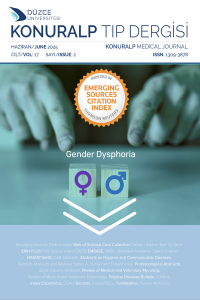Abstract
Tanı araçlarının ve farmasötik müdahalelerin sıklıkla merkez sahne aldığı hızlı tempolu tıp dünyasında, ruhsal Katsayı'nın (SQ) incelikli ama güçlü boyutu, etkili klinik uygulamanın hayati bir bileşeni olarak giderek daha fazla kabul görmektedir. SQ, sadece dindarlık veya inanç sistemlerinden daha fazlasıdır; ruhsal değerleri günlük yaşamına anlama, deneyimleme ve entegre etme kapasitesini ifade eder ve bir anlam, amaç ve bağlantı duygusunu teşvik eder. Geleneksel tıbbi bilginin yerini almasa da SQ, bir klinisyenin gerçekten bütünsel ve şefkatli bakım sağlama yeteneğini önemli ölçüde artırabilir. Hastalar, sadece bir semptom ve laboratuvar sonuçları koleksiyonundan daha fazlasıdır. Derin varoluşsal sorularla boğuşan, korku, belirsizlik ve sıklıkla hastalık karşısında anlam arayışıyla karşı karşıya kalan bireylerdir. Yüksek SQ'ya sahip bir klinisyen, bu temel ruhsal ve duygusal ihtiyaçlara uyum sağlar. SQ, sadece bilgi toplamak için değil, aynı zamanda korkularını, umutlarını ve ruhsal inançlarını anlamak için hastaları gerçekten dinleme yeteneğini geliştirir.
Keywords
Abstract
In the fast-paced world of medicine, where diagnostic tools and pharmaceutical interventions often take centre stage, the subtle but powerful dimension of spiritual Quotient (SQ) is gaining increasing recognition as a vital component of effective clinical practice. More than just religiosity or belief systems, SQ refers to the capacity to understand, experience, and integrate spiritual values into one's daily life, fostering a sense of meaning, purpose, and connection. While not a replacement for traditional medical knowledge, SQ can significantly enhance a clinician's ability to provide truly holistic and compassionate care. Patients are more than just a collection of symptoms and lab results. They are individuals wrestling with profound existential questions, facing fear, uncertainty, and often, a search for meaning in the face of illness. A clinician with high SQ is attuned to these underlying spiritual and emotional needs. SQ cultivates the ability to truly listen to patients, not just to gather information, but to understand their fears, hopes, and spiritual beliefs.(
Details
| Primary Language | English |
|---|---|
| Subjects | Health Informatics and Information Systems, Health Care Administration |
| Journal Section | Letter to the Editor |
| Authors | |
| Publication Date | June 17, 2025 |
| Submission Date | March 28, 2025 |
| Acceptance Date | June 2, 2025 |
| Published in Issue | Year 2025 Volume: 17 Issue: 2 |


